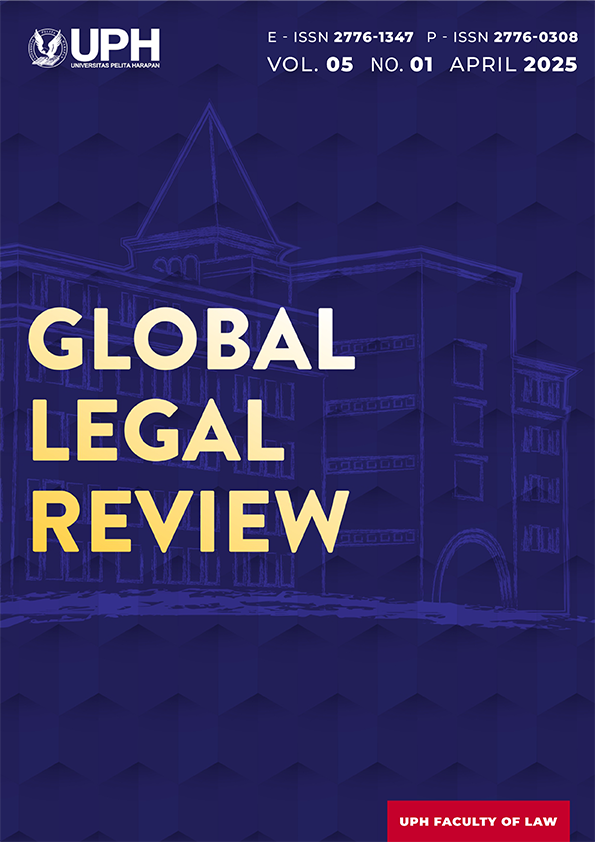The Authority of the Financial Services Authority Regarding the Application for Postponement of Debt Payment Obligations for Insurance Companies in the Legal Certainty and Justice Perspective
DOI:
https://doi.org/10.19166/glr.v5i1.7525Trefwoorden:
Creditors, Application for Postponement of Debt Payment Obligations, Insurance CompanySamenvatting
From a normative juridical perspective, the Financial Services Authority (OJK) grants the authority to apply for Postponement of Debt Payment Obligations (PKPU). On the basis of this authority, OJK has never given approval to creditors to apply for PKPU against debtor insurance companies. The research results show that normatively the space for creditors to apply for PKPU against insurance companies is closed and not possible. The Panel of Judges in PKPU Decision Number 389/Pdt.Sus-PKPU/2020/PN-Niaga.Jkt.Pst. applied the law as form of social control and social engineering. There is a need to update the PKPU application procedure which can be submitted by creditors. The main issues include the provisions regarding the bankruptcy application procedure in Law Number 40 of 2014 on Insurance apply mutatis mutandis to PKPU applications; Bankruptcy application procedures in OJK Regulation Number 28/POJK.05/2015 applies mutatis mutandis to applications PKPU; Addition of phrases to Article 2 paragraph (5) Law Number 37 of 2004 on Bankruptcy and Suspension of Debt Payment Obligations, namely "…….. or Creditors whose terms and conditions are regulated based on laws and regulations"; and Additional provisions in POJK Number 28/POJK.05/2015 , in the event that the OJK does not provide a response, the creditor can submit a PKPU or bankruptcy application directly to the Commercial Court.
Referenties
Ashofa, Burhan. Metode Penelitian Hukum. Jakarta: PT Rineka Cipta, 2001.
Badan Pembinaan Hukum Nasional Departemen Hukum dan Hak Asasi Manusia RI. Laporan Akhir Pengkajian Hukum tentang Aspek Hukum Pemailitan Perusahaan Asuransi di Indonesia. Jakarta: Badan Pembinaan Hukum Nasional Departemen Hukum dan Hak Asasi Manusia RI, 2005.
Hartono, Darminto. Economic Analysis of Law Atas Putusan PKPU Tetap. Jakarta: Lembaga Studi Hukum dan Ekonomi Fakultas Hukum Universitas Indonesia, 2009.
Hartono, Sri Redjeki. Hukum Asuransi dan Perusahaan Asuransi. Jakarta: Sinar Grafika, 2001.
Ibrahim, Johnny. Teori dan Metodologi Penelitian Hukum Normatif. Malang: Bayumedia Publishing, 2006.
Manan, Bagir. Menegakkan Hukum Suatu Pencarian. Jakarta: Asosiasi Advokat Indonesia, 2009.
Muladi. Hak Asasi Manusia: Hakekat, Konsep dan Implikasinya dalam Perspektif Hukum dan Masyarakat. Bandung: Refika Aditama, 2007.
Otoritas Jasa Keuangan. “Daftar Perusahaan Asuransi Umum, Jiwa, Reasuransi, Asuransi Wajib dan Asuransi Sosial.” Accessed March 5, 2023. https://www.ojk.go.id/id/kanal/iknb/berita-dan-kegiatan/publikasi/Pages/Daftar-Perusahaan-Asuransi-Umum,-Jiwa,-Reasuransi,-Asuransi-Wajib-Dan-Asuransi-Sosial.aspx.
Otoritas Jasa Keuangan. Buku Saku OJK. Jakarta: Otoritas Jasa Keuangan, 2015.
Poedjosoebroto, Santoso. Beberapa Aspek tentang Hukum Pertanggungan Jiwa di Indonesia. Jakarta: Bharata, 1996.
Prakoso, Djoko. Hukum Asuransi Indonesia. Jakarta: PT Rineka Cipta, 2004.
Purwanto, Harry. “Keberadaan Asas Pacta Sunt Servanda dalam Perjanjian Internasional." Jurnal Mimbar Hukum 21, no. 1 (2009): 155–170. https://doi.org/10.22146/jmh.16252.
Saleh K., Wantjik. Kehakiman dan Peradilan. Jakarta: Simbur Cahaya, 1976.
Sendra, Ketut. Konsep dan Penerapan Asuransi Jiwa Unit-Link: Proteksi Sekaligus Investasi. Jakarta: Penerbit PPM, 2004.
Sinaga, Syamsudin M.. Hukum Kepailitan Indonesia. Jakarta: PT Tatanusa, 2012.
Sinamo, Nomonsen. Ilmu Perundang-undangan. Jakarta: Jala Permata Aksara, 2016.
Sjahdeini, Sutan Remy. Hukum Kepailitan: Memahami Undang Undang Nomor 37 Tahun 2004 tentang Kepailitan. Jakarta: PT Pustaka Utama Grafiti, 2010.
##submission.downloads##
Gepubliceerd
Citeerhulp
Nummer
Sectie
Licentie
Copyright (c) 2025 Novio Manurung

Dit werk wordt verdeeld onder een Naamsvermelding-GelijkDelen 4.0 Internationaal licentie.
Authors who publish with this journal agree to the following terms:
1) Authors retain copyright and grant the journal right of first publication with the work simultaneously licensed under a Creative Commons Attribution License (CC-BY-SA 4.0) that allows others to share the work with an acknowledgement of the work's authorship and initial publication in this journal.
2) Authors are able to enter into separate, additional contractual arrangements for the non-exclusive distribution of the journal's published version of the work (e.g., post it to an institutional repository or publish it in a book), with an acknowledgement of its initial publication in this journal.
3) Authors are permitted and encouraged to post their work online (e.g., in institutional repositories or on their website). The final published PDF should be used and bibliographic details that credit the publication in this journal should be included.

